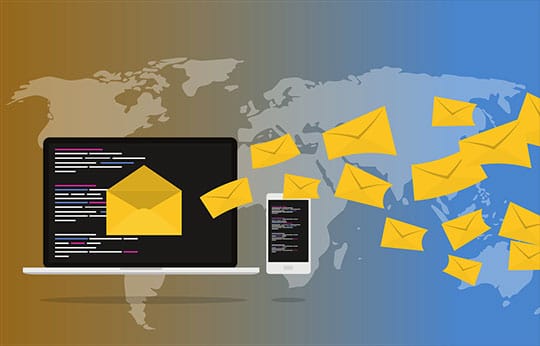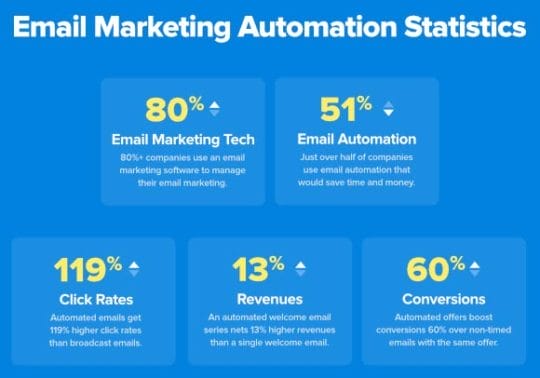CRM and marketing automation is the new rage among the marketers, as they scout for new ideas and technologies to increase the leads for their sales team. These technologies have emerged as a perfect combination to sail the marketing campaign in the right direction and generate the best leads. It can also help in reaching the customers at each phase of the marketing funnel.
As a marketer, you would be surely having these questions in your mind:
- Do I really need email marketing, marketing automation, and CRM?
- How effective will it be for my organization?
Most of the organizations struggle in getting the quality leads, as they cannot figure out the perfect strategy, technology aligned with their business process. Email marketing, which has been proved as a reliable marketing strategy by high-end organizations and by the leading marketers, has evolved over the years. The new techniques such as CRM and marketing automation is providing the right boosters for the process and achieving the business goal.
The Importance

Before going deep into the process first let’s analyze the importance of the mentioned technologies:
Marketing automation:
It’s a software which helps in nurturing the leads and automating the tasks. The tool helps in systemizing and automating the marketing effort based on specific triggers.
CRM:
Customer Relationship Management is a comprehensive system to manage a company’s interactions with current and prospective customers. It is an essential part of the business process. The system is a combination of technology and strategy, used to develop and manage client relationships.
Email marketing:
Email marketing helps in reaching customers easily, efficiently, and at the right time.
All the above are equally important, and with the right integration helps in converting high-qualified leads into customers.
The latest report from Salesforce also states that CRM application:
- Increase sales by up to 29%.
- Sales forecast accuracy by 42%.
- Sales productivity by 34%.
Recommended for you: Your Complete Guide to Run a Perfect Influencer Marketing Campaign.
The demographic data and location for personalizing the emails

CRM – the customer relationship management stores huge data of the customer’s contacts. The data such as the phone number, postal address, mail address, etc. helps in sending the personalized emails to the customers. It’s a fact personalized emails receive a higher number of open rate and click-through rates.
Sending emails as per the time zone, region, etc. can work in huge favor for organizations which have customers dispersed across the world. A US customer has different needs and requirements as compared to other regions and countries. With the help of CRM data, emails can be personalized to outreach these customers at their suitable time and preferences. Further segmentation of the data based on the city, rural, state, urban, etc. helps in greater personalization of the email. Accurate segmentation helps in tailoring the right and relevant content for the recipient.
The other data which needs to be considered is gender. Both female and male audience have a different thinking pattern. While targeting the female audience, the message has to be illustrative and descriptive. They should get the feeling that you understand and support them. For the male audience, the message has to be concise and powerful. With the help of CRM, this is made all possible.
Developing accurate buyer personas

Marketing is successful only when it accurately targets the right audience.
Now, the question arises how to target the right audience?
The CRM can identify the trends within the database for developing specific buyer personas to personalize the email campaigns. The buyer persona is the representation of the ideal client. Developing an accurate persona starts with:
Asking The Right Questions:
These are the questions for which you have to search for the answer; for which markets are the personas being developed? Which are the company’s existing solutions that align with these markets? What features do your potential customers care about most? What are the daily concerns of your prospects at the organization?
Doing Your Own Research:
A company’s website serves as a good resource to understand their business model, target industry, company size, company values, key motivators, and other factors. You have to execute your own research in the quest to develop an accurate persona.
Consulting Sales and Marketing:
The sales team are the frontline employees directly interacting with the customers. For this reason, they can shed light on the points directly impacting a customer and their purchase behavior. The marketing team can identify the essential demographics and firmographic trends of personas with the preferred web habits and the engagement channels.
Paying Attention to Senior Management Needs:
It is important to pay attention to senior management needs. CMO (Chief Marketing Officer), for example, have different challenges as compared to the challenges faced by other C-level executives. They aim for improvised customer experience, organizational change in the marketing department, etc. When you understand their needs, then you can develop an accurate buyer persona.
You may like: Email Marketing Statistics You Need to Know in 2019 (Infographic).
Triggering the workflow:
Marketing automation facilitates in triggering the workflows based on the specific actions of the user ranging from the abandonment of the online shopping cart, signing up for the newsletter, and other related actions by the customer. Every action of the user is considered as valuable data, and automation entirely depends on it.
As customers traverse the buyer journey, your automated emails also move with them. These emails do not lose focus on your targeted potential customer as they might get converted someday. It also helps in connecting with new customers and also cultivating a two-way relationship.
Image source: https://optinmonster.com/31-best-email-marketing-automation-tools/.
Marketing automation streamlines the sales funnel and makes it efficient. The sales team can target the quality leads, which your lead campaigns nurture at different marketing stages. The automation also helps in segmenting the emails, thus increasing the click-through by 50%.
Some of the best automation practices are:
Being specific of what to achieve:
As a marketer, collecting successful examples of marketing automation campaigns can give the right ideas. A complete collection of the data of the current and future marketing strategies provides the right path to set the goals in achieving the perfect automation process.
Thinking of segmenting your audience:
Segmentation is one of the best elements for a successful automation process. It takes time for segmenting a larger customer database as varied products are known to appeal to people of different age groups. Sometimes the product also appeals to customers with varying levels of responsibility at an organization.
Testing:
Keep track of the campaigns with the A/B testing. Trying different subject lines, sending at different time zone is found to be resonating with most of the audience. You can check the targeted messages which are not doing well and use that information for improvising in your next email campaign. On the other hand, you can even check which of the messages are doing well and from that implement the insights for the future marketing campaign.
SQL (Sales Qualified Lead):
Once the sales team accepts the lead and starts following up with them, they start determining whether the lead will be interested enough for an opportunity. If the answer is positive, then it means an opportunity can be created, which is then labeled as an SQL.
Benefits of the integration

CRM and marketing automation are the perfect integration for email marketing. The benefits which it provides are:
It Ensures The Alignment Of Sales And Marketing:
Almost every organization has some sort of communication gap between sales and marketing. Marketing automation and CRM bridges this gap and makes the process seamless. It improves accountability by introducing the standardized process for the lead follow-ups.
Ensures A Clean And Effective Database:
The valuable asset of any business is its marketing database, but it has been found that many times the database gets cluttered with the duplicate data. Marketing automation and CRM provides an efficient process of cleaning up the duplicate data, thus eliminating the need to pay for the extra services to the outside agencies.
Saves The Cost:
The complete integration of CRM and marketing automation can lead to cost savings. It helps in utilizing the internal team strengths and cutting down on the outsourcing assignments.
Monitors The Campaign Performance:
You would really like to know the performance of your email campaign. Majority of the automation tools helps in setting up the automated reports which can evaluate the performance of your email marketing campaign. It can also help in future marketing initiatives and achieving your goals at the right time.
Email marketing from the CRM database offers the right flexibility and the highest return on investment. It has even proved to be 40 times more effective in pulling customers than from the other mediums like Facebook and Twitter.
You may also like: How to Hack Instagram Marketing Using Influencers?
Conclusion:

Email marketing, as one of the highest revenue generators, will continue to be a part of every marketing strategy in major organizations. It will get further improvised with the right integration of CRM and marketing automation to generate good sales and revenue numbers.
As a marketer, you are solely responsible for checking whether there has been the right implementation of these technologies. Powering up the marketing strategy by following all the required steps can make the integration successful for your business.
This article is written by Robert Jordan. He is a seasoned marketing professional with over 10 years of experience, currently working as Media Relations Manager at InfoClutch Inc. He has expertise in setting up the lead flow for budding startups and takes it to the next level. Robert has a deep interest in SEO, SEM & Social Media related discussions. Follow him: Twitter | Facebook.

 This article is written by Robert Jordan. He is a seasoned marketing professional with over 10 years of experience, currently working as Media Relations Manager at
This article is written by Robert Jordan. He is a seasoned marketing professional with over 10 years of experience, currently working as Media Relations Manager at 





